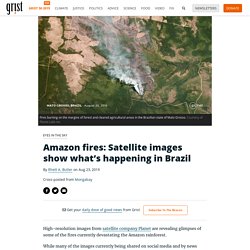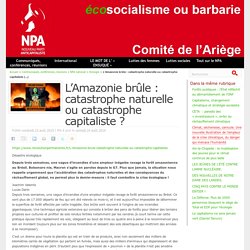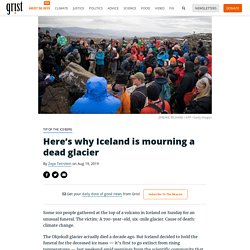

La Nasa publie des images terrifiantes de l'ouragan Dorian. L’administration Trump veut alléger le contrôle des émissions de méthane Le prochain rapport du Giec s’annonce inquiétant Greta Thunberg: We need a ‘concrete plan’ for climate action, not nice words. This story was originally published by the Guardian and is reproduced here as part of the Climate Desk collaboration.

Unprecedented pressure exerted by young activists will push world leaders to address the unfolding climate crisis, even with a recalcitrant U.S. under Donald Trump, Greta Thunberg told the Guardian. Thunberg, the teenager whose school climate strikes have ignited a global youth-led movement, said that her journey to New York on a solar-powered yacht was symbolic of the lengths young people will take to confront the climate crisis.
G7 : ÉTAT DE SIÈGE AU PAYS BASQUE. Amazon fires: Satellite images show what’s happening in Brazil. High-resolution images from satellite company Planet are revealing glimpses of some of the fires currently devastating the Amazon rainforest.

While many of the images currently being shared on social media and by news outlets are from past fires — some from as long as 15 years ago — satellites can provide a near real-time view of what’s unfolding in the Amazon. With near-daily overflights and high-resolution imagery, Planet’s constellation of satellites is providing a clear look at some of the fires now burning in the Brazilian Amazon. Beyond dramatic snapshots, those images also provide data that can be mined for critical insights into what’s happening in the Amazon on a basin-wide scale, according to Greg Asner, the director of the Center for Global Discovery and Conservation Science at Arizona State University, whose team is using Planet’s data to assess the impact of the fires on carbon emissions.
However that may soon change — for the worse. This space-age tech cuts cooling costs — and carbon emissions. It’s hot outside!

And our need to get cool is making us hotter: The number of room air conditioners is expected to skyrocket from 1.2 billion units worldwide today to 4.5 billion units by 2050, representing about 15 percent of our global carbon emissions, according to the Rocky Mountain Institute. That’s why Silicon Valley startup SkyCool Systems is trying to drag cooling technology into the space age. Literally: The company is freezing ice cream — and cooling office buildings — using the cold of space. Here’s how it works: Every object on earth lets go of heat in the form of infrared light — and some of that infrared light fits right through a “window” in the atmosphere, escaping into the void.
The sun usually counteracts sky cooling, which is why it only works at night — that is, until a group of Stanford nerds got ahold of it, and created a new material that’s such a good mirror to the sun’s rays that it can take advantage of the effect even in the daytime. Q. L’Amazonie brûle : catastrophe naturelle ou catastrophe capitaliste ? Désastre écologique Depuis trois semaines, une vague d’incendies d’une ampleur inégalée ravage la forêt amazonienne au Brésil.

Bolsonaro nie, Macron s’agite en paroles depuis le G7. Plus que jamais, la situation nous rappelle urgemment que l’accélération des catastrophes naturelles et des conséquences du réchauffement global, ne permet plus la demie-mesure : il faut combattre la crise écologique ! Baisse du trafic aérien en Suède, plombé par la « honte de voler » Est-ce l’effet Greta Thunberg, l’icône suédoise de la lutte contre le réchauffement climatique qui traverse actuellement l’Atlantique en bateau, ou bien d’autres facteurs, certains conjoncturels ?

Selon les spécialistes suédois du transport aérien, il est encore trop tôt pour le dire. L'Union européenne doit déclarer l'état d'urgence climatique ! Météo: Des canicules plus longues, même avec un réchauffement limité à +2°C. Canicules, sécheresses, pluies… Déjà plus intenses et plus fréquents, les extrêmes météo des étés de l’hémisphère nord vont aussi durer plus longtemps, même avec un réchauffement de la planète limité à +2°C, selon une étude publiée lundi.

Here’s why Iceland is mourning a dead glacier. Some 100 people gathered at the top of a volcano in Iceland on Sunday for an unusual funeral.

The victim: A 700-year-old, six-mile glacier. Une plaque pour marquer la disparition d’un glacier islandais BNP, Société Général, Crédit Agricole, Banque Populaire et Crédit Suisse: Cessez de miser sur le chaos climatique. How do countries cover climate change? Depends how rich they are. Deadly heat waves, violent downpours, wildfires that seem to get more intense every year — the climate crisis leaves no part of the globe untouched.

But around the world, the media spins warming and its effects differently. The No. 1 sign of how the press in a given country talks about it? Wealth. Richer nations tend to politicize the issue, while poorer nations more often present it as a problem of international concern, according to a new study published in the journal Global Environmental Change.
Researchers in Kansas and Vietnam analyzed more than 37,000 news articles from 45 countries and territories using computer algorithms and found that the strongest predictor of how a given country’s press will cover climate change is Gross Domestic Product per capita. Climat. La vidéo en ligne émet autant de gaz à effet de serre que l’Espagne. Facebook Zero Fossile. Mark Zuckerberg, PDG de Facebook Pétition.

Climat. Le retour à la terre avant que la terre ne brûle. Transformer le système pour ne pas laisser brûler les terres et les ressources alimentaires : rarement rapport du Giec aura été si tranché en matière de tournant à opérer.

Dix mois après sa précédente analyse, qui explorait notre capacité à contenir les températures mondiales à un maximum de réchauffement de 1,5 °C, le Groupe intergouvernemental d’experts sur l’évolution du climat s’est cette fois penché sur le secteur des terres – soit la vaste partie émergée du globe, inclus les systèmes agraires et leurs interactions avec la mécanique atmosphérique. A hot planet threatens food and water more than realized, IPCC says. This story was originally published by Mother Jones and is reproduced here as part of the Climate Desk collaboration. As the planet warms, parts of the world face new risks of food and water shortages, expanding deserts, and land degradation, warns a major new report from the United Nations’ Intergovernmental Panel on Climate Change. Those effects are already underway, and some of them could soon become irreversible.
The changing climate has already likely contributed to drier climates in South and East Asia, North Africa, and the Middle East, reducing the food and water supply. In 2015, about 500 million people lived in dry areas that experienced desertification in recent decades as a result of human activities. Those problems are only going to get worse as climate change continues to take its toll. Last year, the same body issued the alarming finding that we have roughly a dozen years left before the world misses its window for averting runaway global warming. Climate change is making it more dangerous to eat certain fish. It may not be a cataclysmic turning point in the climate crisis, but global warming has officially come for your fish tacos.
Climat : pourquoi faut-il changer notre système agricole et alimentaire (...) Climat. Le Giec met le focus sur les terres. Assurer la sécurité alimentaire mondiale malgré le réchauffement climatique : le rapport du GIEC adopté. VIDEO. Les catastrophes climatiques se multiplient sur la planète. Avion, flygskam et climat : les scientifiques interrogent leurs modes de transport. Chaleur extrême : la moitié des températures maximales battues cette année en France.
Les experts du climat se penchent sur le rôle crucial des terres. BEI : Byebye fossiles ? cyberaction. #Energies #fossilesLa BEI songe à cesser d'ici fin 2020 le financement d'énergies fossiles, dans un plan dévoilé vendredi dernier, et salué par les ONG. une démarche «conforme aux engagements pris par l'Europe lors de l'accord de Paris sur le climat» selon l'institution. La proposition doit encore être approuvée par les 28. [ 713 participations ] Cyberaction mise en ligne le 02 août 2019.